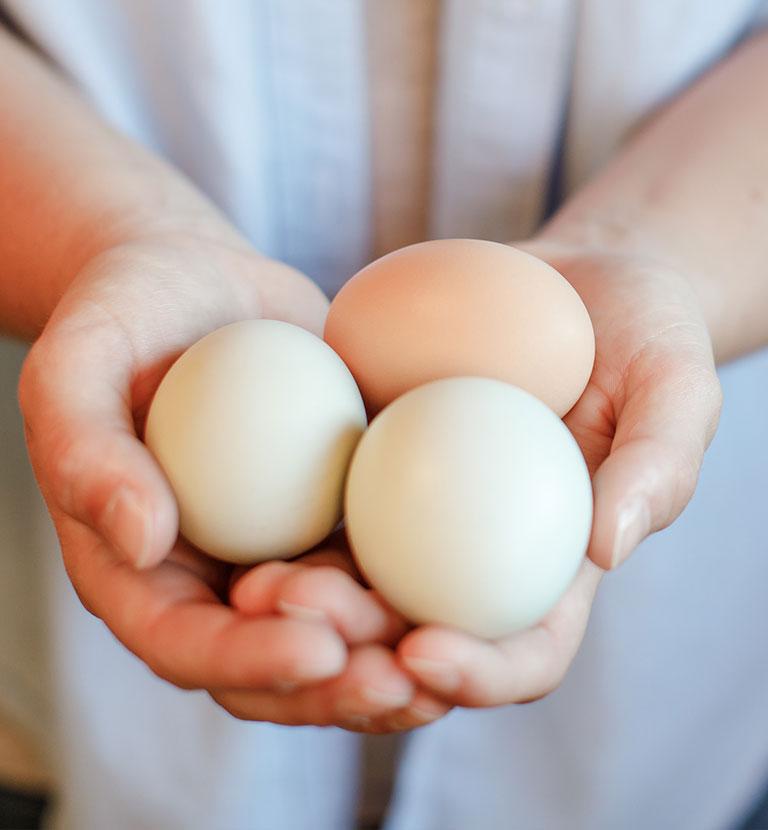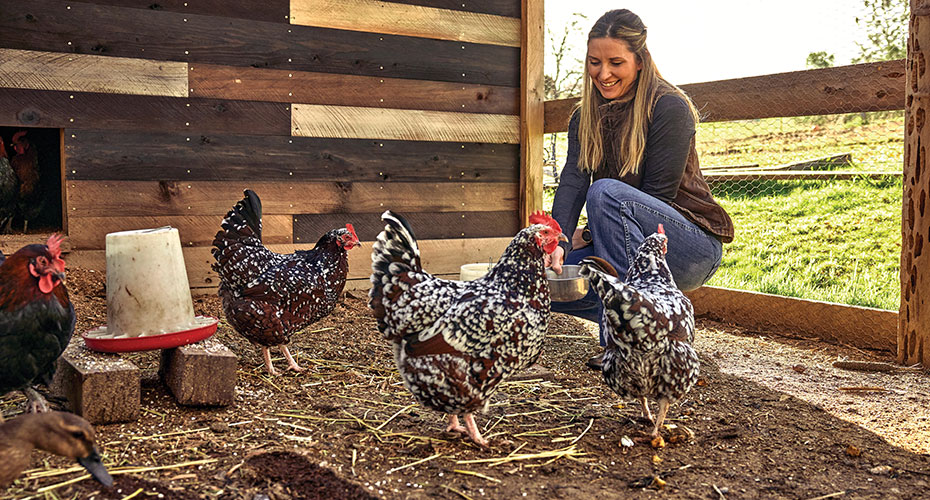Poultry Feed FAQs
Click on a question below to display the answer. Don’t see the question you are looking for? Visit the Contact Us page to submit your question!
Feed Freshness
-
What is the shelf life of your poultry feeds?
When stored properly in dry, moderate temperature conditions, feed can be stored for up to 4 months, although we recommend usage within 60 days in hot, humid summer months and 90 days in cooler months. Always inspect feed prior to use for bugs, mold, or other evidence of damage.
-
How can I tell how fresh my feed is?
Nutrena feed bags are marked on the tag with a code that indicates what day that bag of feed was produced on.
On the tag, look for “Lot:” followed by a series of numbers and/or letters. The first two digits (may be letters or numbers) indicate which plant made that product, and then there are 4 digits strung together – the first digit indicates the year, so anything made in 2016 would have a 6, anything after the 1st of 2017 has a 7. Then the next three numbers are called the “Julian Date Code” – these number the days of the year. So, Jan 1 is 001, Jan 2 is 002, and so on until December 31 is 365.
Example: WB6121 or 596121. These Lot codes would indicate product made in 2016, on the 121st day of the year, or May 1st.
The first day of each month corresponds with the following Julian Date code:
001 = Jan 1st
032 = Feb 1st
060 = March 1st
091 = April 1st
121 = May 1st
152 = June 1st
182 = July 1st
213 = Aug 1st
244 = Sept 1st
274 = Oct 1st
305 = Nov 1st
335 = Dec 1st
About Nutrena Poultry Feeds
-
Does Nutrena offer any poultry feeds that contain medications?
Both the NatureWise and Country Feeds product lines offer a medicated Chick Starter Grower. Availability is regional, please check with your local Nutrena retailer for product availability.
-
Do your poultry feeds contain any added hormones?
No, Nutrena poultry feeds do not contain any added hormones.
-
Do you offer any organic poultry feeds?
We offer Nature Smart Organics Poultry Feed. Availability is regional, please check with your local Nutrena retailer for product availability.
-
Do you offer any soy-free poultry feeds?
We are pleased to offer NatureWise Hearty Hen, a soy free layer feed.
-
Do your poultry feeds contain any animal by-products?
NatureWise brand poultry feeds do not contain any animal by-products.
Country Feeds brand products may contain animal by-products, as they are a good source of amino acids (protein), energy, calcium and phosphorus.
-
Do your feeds contain any ingredients from other countries?
Cargill, the maker of Nutrena brand products, manufactures its U.S. products entirely within the United States but those products do, in some instances, contain ingredients imported from outside the United States. In those instances, we work closely with our suppliers on controls for promoting high levels of quality and safety in the sourcing of ingredients.
At Cargill, food safety is a top priority. As there continue to be news reports related to contaminated ingredients we want to assure you that we are evaluating and assessing each new concern. Our approach to these concerns has been to recognize that issues related to intentional and unintentional product contamination are not exclusively unique to any single country or any single product type. We emphasize the use of a rigorous qualification process for all of our suppliers in all countries where we source raw materials to ensure the proper controls and quality and food safety procedures are in place for any of the materials that come in contact with our product. We assure you that Cargill meets all regulatory requirements for its production of animal feed in the United States. Accordingly, we do not expect any of the raw materials that we use in our animal feed products to be of concern.
-
Do your poultry feeds contain Genetically Modified grains?
Yes. Some of our products may contain genetically modified ingredients. It’s important to remember that all grain is technically genetically-modified, as simple plant breeding is a form of genetic modification.
Agricultural biotechnology (including genetically engineering grain in a laboratory to enhance desired traits) is thoroughly researched, regulated, and safe to feed your animal. GMO ingredients are prevalent in the feed supply chain. Because grain for feed is purchased in bulk from large storage facilities, it is not possible to tell which corn has been genetically engineered. It is possible to specifically purchase “non-GMO” grains, but this comes at a premium price. Producing feed with non-GMO grains would be cost prohibitive.
The US Department of Agriculture has facts about Agriculture Biotechnology on their website: http://www.ers.usda.gov/briefing/biotechnology/
-
Do any of your poultry feeds contain roxarsone or any other arsenic-containing additive?
No, our feeds do not contain these ingredients.
Product Selection
-
Is it OK to feed layer feed to chicks?
Layer feed is not properly balanced for chicks, as it will contain too much calcium. While one or two feedings should not cause a problem, a continuous diet of layer feed to chicks is NOT balanced for proper growth, and chicks may also experience kidney damage.
-
Should baby chicks have grit?
All poultry can have grit and will benefit from it. Note that this is different from oyster shell and coarse calcium carbonate, and does not provide any nutritional benefit – it instead aids in the digestive process.
-
Do you offer a breeder ration for hens?
Both the NatureWise and Country Feeds Layer feeds meet the nutritional requirements of hens to lay eggs. The nutritional requirements of the hen do not change based on the use of the eggs. A separate breeder ration is not required for producing baby chicks versus producing eggs for consumption.
-
What feed do you recommend for geese or ducks that are kept as pets?
Geese or ducks that are kept as pets or farmyard animals may be fed either the Country Feeds All Flock or the NatureWise All Flock products.
-
I don’t see gamebird feeds listed on your site. Do you have any?
Nutrena does offer gamebird feeds on a regional basis, please check with your local Nutrena retailer for availability.
Health & Management
-
How much feed should I expect my birds to consume?
Here are some basic guidelines for how much feed you can expect to go through per bird:
If you have a baby chick, you can estimate about 10 pounds of feed for the first 10 weeks per bird.
If you are raising adult birds, the average amount they will eat per week per bird is about 1.5 lbs.
Amounts will vary however, based on breed, size, if they are producing eggs, if they are allowed to roam and scavenge for bugs, insects, grass, etc.Until you are comfortable with how much your birds are eating, you will probably want to check on them a couple of times a day and make sure that their feeders are not getting empty.
Running your birds out of feed can result in reduced laying, slower growth and less gain.
-
When should I start providing grit for my chickens?
You’ll want to start your chicks on grit once they leave the brooder and are introduced to outside forage/feed sources that are not solely a pellet or crumble.
For example, once you start feeding scratch or any grains or once they start foraging on grass/greens or bugs. While they are ONLY eating a pelleted or crumble feed they don’t need grit since their gastric juices are enough to break the food down adequately. But as soon as they get other types of feed they need the grit to break it down so the gut can absorb it.
-
Is it necessary to supplement my laying hens diet with oyster shells?
It is a good idea to provide oyster shell to your laying hens as a supplemental source of calcium. While Nutrena layer feeds do contain higher levels of calcium for strong eggshells, the level of calcium your hens need will vary based on many factors including age, production level, temperature, environmental factors, etc.
Providing oyster shell free choice to your hens will allow them to take in more when they need it and help prevent things like soft eggshells, prolapses, and other issues. It is better for your hens to have it and not need it then to need it and not have it.
-
What is amprolium, and what is it for?
Amprolium is a medication used to aid in the prevention of coccidiosis.
-
What happens if a laying hen eats medicated chick starter? Should we dispose of her eggs for a few days?
Laying hens can be fed amprolium, and eggs are safe for human consumption. There is no need to dispose of the eggs.
-
What is the withdrawal period for meatbirds started on medicated chick starter?
There is no withdrawal period for meatbirds receiving the NatureWise or Country Feeds Medicated Chick Starters.
-
My birds have started pecking at each other, or becoming aggressive. What is making that happen?
There are a variety of issues that may cause pecking or other aggressive behaviors. One common cause to look for is possible changes in weather that would force the birds to spend more time indoors, where crowding may cause the behavior.
-
How do I keep hens from eating their eggs?
Egg eating can be a frustrating and costly problem – and unfortunately it is a hard habit to break once established. The birds may be lacking that essential nutrient and are finding it in the eggshells. Although our Nutrena layer feeds have extra calcium, it is always still a good idea to provide it free choice through the use of oyster shell. Another possibility is that during molt, your birds were seeking extra protein sources and learned to eat eggs to satisfy that need. They may be done molting, but have learned that eggs are a tasty treat.
After you give them some oyster shell, you can try a couple of things to help get them to stop the egg eating habit like collect eggs frequently throughout the day to minimize the chance of eating. You can also try putting golf balls or hard fake eggs in the nests so that when they peck they don’t get anything from them; this will sometimes help cure the problem. If one or two birds are eating the eggs be sure to separate them quickly from the rest, as the others will copy this behavior.
-
Our eggs have blood spots in them. Should I be concerned?
Blood spots in eggs can be an indicator of a rupture of some of the tiny blood vessels within the egg itself. As the egg develops, the yolk and the white usually separate at a place where there are no vessels, but occasionally a vessel will happen to get ruptured.
This can be seen more frequently in older birds or very young birds just starting to lay. It can also be a hereditary trait. These small blood spots are not harmful and the egg can still be consumed.
-
My hens lost color in their combs during/after they molted. Is this normal?
Loss of color on the comb during/after molt is something that happens often and not something to be too concerned about, especially if your hen’s attitude is the same and she is eating and drinking as normal.
-
Is it OK to keep my hends around my horses?
Absolutely! Chickens make excellent barnyard companions for horses. Along with the insect control and composting skills the chickens provide, horses will benefit from some natural “de-spooking” training!


